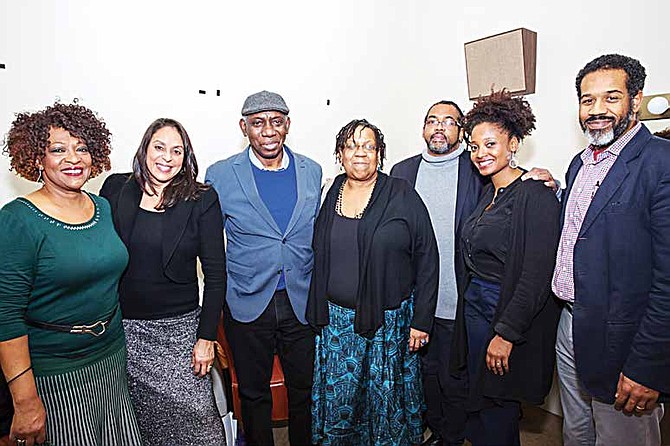THE ART INSTITUTE OF CHICAGO PAYS TRIBUTE TO GWENDOLYN BROOKS
THE ART INSTITUTE OF CHICAGO PAYS TRIBUTE TO GWENDOLYN BROOKS
Our Miss Brooks 100 is an ongoing centennial celebration of the life and legacy of Gwendolyn Elizabeth Brooks. If Ms. Brooks were alive today she would be celebrating her 100th birthday on June 7, 2017.
This exhibit was kicked o with a special unprecedented and high-profile reading of Brooks’ works. Held in the Rublo Auditorium at the Art
Institute of Chicago, 111 S. Michigan Avenue in Chicago.
The event brought together five Pulitzer Prize winning African American poets, all of whom expressed at some point during the evening how profound an impact Brooks’ had on their life and their work as artists
and poets. Our Miss Brooks 100 honors her legacy and inspires a new generation of writers and poets.
This unique literary experience was a collective and collaborative eort of many institutions, artists, and educators who came together to create readings, performances, schools programs, discussions, exhibits
and more through June 2018. The special readings were hosted by WGCI’s Morning Show co-host Kendra G and a panel discussion to place after the readings was hosted by WBEZ’s Natalie Moore.
The poets in attendance were Rita Dove, a former U.S. Poet Laureate and recipient of the 1987 Pulitzer Prize in poetry for Thomas and Bueulah.
Dove was also celebrating the 30th anniversary of her Pulitzer. She was joined by Gregory Pardlo, a 2015 Pulitzer Prize winner; Tracy K. Smith, a 2012 Pulitzer winner; Natasha Trethewey, 2007 Pulitzer winner and Poet Laureate for the United States (2012-2014); and Yusef Komunyakaa, 1994 Pulitzer winner.
Moore asked the panel what they most admired about Brooks’ work and Gregory Pardlo said, “She can read people so easily, she was so observant.”
Dove began her remarks with, “Thank you Ms. Brooks!” She went
on to say, “I admire her ability to sing the songs of those around her and make them come alive to the world around her.”
Komunyakaa said, “There is a singing inside each poem, I admire
that. It’s as if worlds collide in a single poem.” Smith remarked, “Her
sense of curiosity inspired me. Her poems are so beautifully adequate
at reaching into other’s lives.”
The panel went on to discuss how important the work of writers, poets and artist are during this dierent political landscape. Dove said, “There is power in being able to communicate and touch
people all over the world in special way - that is the essence of our humanity in a time where there are those in power trying to silence the voices of the people.”
A writer, poet and true lyricist, Gwendolyn Brooks as noted by the Poetry Foundation was one of the most highly regarded, highly influential, and widely read poets of 20th-century American poetry.
The Poetry Foundation and other biographical sources cite Brooks as having the distinction of being the first black author to win the Pulitzer Prize and the first black woman to become poetry consultant to the Library of Congress (a title and position which is now known as the Poet Laureate).
Brooks was also the poet laureate of the State of Illinois from 1968 until her death in 2000.
She also received an American Academy of Arts and Letters Award, the Frost Medal, a National Endowment for the Arts Award, the Shelley Memorial Award, and fellowships from the Academy of American Poets and the Guggenheim Foundation. Born in Topeka, Kansas, Brooks’ family moved to Chicago when she was young. Her parents supported her passion for reading and writing.
Brooks was 13 when her first published poem, Eventide, appeared
in the publication American Childhood and by the time she was 17, she was publishing poems frequently in the Chicago Defender.
After attending junior college and working for the National Association for the Advancement of Colored People, she developed her craft in poetry workshops and began writing the poems, focusing on urban blacks that would be published in her first collection,
A Street in Bronzeville.
Many of Brooks’ works displayed a political consciousness, especially those from the 1960s and later, several of her poems reflected the civil rights activism of that period. Her work has stood the test of time influencing not just the work of other poets, but some in the hip hop generation, including people like Chance the Rapper,
Lupe Fiasco and Rhymefest.
This event was presented in collaboration with the School of the Art Institute of Chicago, the Poetry Foundation, Poets & Writers, the Guild Literary Complex, the Chicago Community Trust, and encouraged by the Pulitzer Prizes.
Latest Stories
- Leaders Network Financial and Great Lakes Credit Union Open Permanent Branch in Austin Neighborhood of Chicago
- DUSABLE MUSEUM TRUSTEE CAROL MOSELEY BRAUN APPOINTED CHAIRMAN OF THE U.S. AFRICAN DEVELOPMENT FOUNDATION
- ASSESSOR HOSTS 2024 MARKET INVESTOR DAY
- One Night Only Performance Show Dance Company Entering ‘New Horizons’
- New Choice Intervention Provides Much Needed Mental Health Services To The Community
- University of Chicago Program Brings Mavis Staples To Campus
- Larry’s Barber College Set For Expansion Of Facility And Education Programs
- Art Exhibit Shows And Tells The Stories Of Widows
- Introducing Shot Bar's New Location
- Illinois Reparations Coalition Advocates for Guaranteed Income Program as Drug War Reparations
Latest Podcast
Sydney Blaylock-The local skater with national experience

